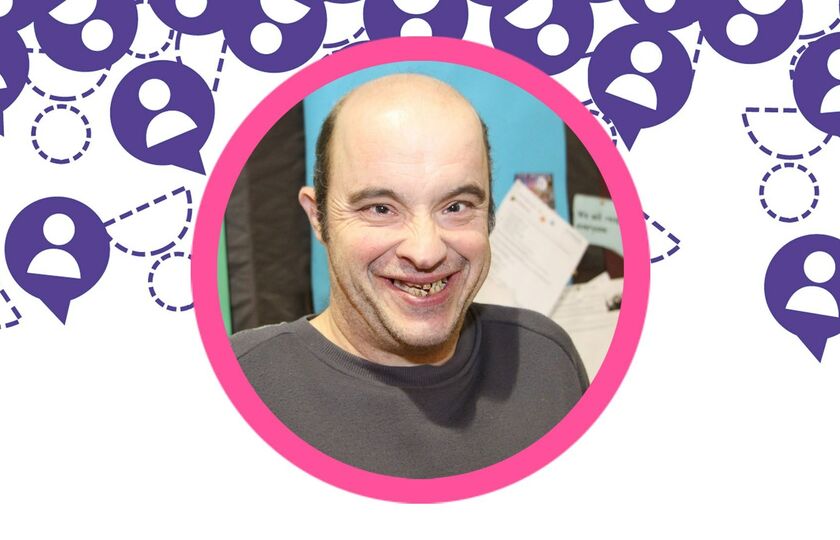This book uses clear, easy to understand language to answer questions about sex and relationships, and covers subjects from puberty to consent with accuracy and honesty.
Supported Loving toolkit
Having conversations

Uh, oh. Someone wants to talk to you about sex and they're asking lots of awkward questions. What can you say?
They obviously haven’t had much sex education or ‘the talk’ and are asking you lots of awkward questions. What can you say? This toolkit explores what is ok to say, to who and when.
Many people feel anxious when they get asked to talk about sex and it can be really easy to avoid talking about sex and change the subject. However, if we do not communicate clearly and calmly about the topic, then the people who are wanting to discuss sex may seek out other, less reliable, sources of information. Poor or fake information could mean that someone does not know what legal sexual behaviour is or what consent means. They could be at risk from an unwanted pregnancy or sexually transmitted infection, and they may not know where to go for help. This is true for anyone, but if you have additional challenges in your life such as a learning disability, then the lack of good information could make you additionally vulnerable to sexual harm.
If someone wants to talk about sex with you, first - take a breath. You don’t have to answer the question straight away, it is ok to say, “that’s a good question, let me go and look some information up so I can give you the right answer.” Giving yourself some breathing and thinking space can usually help you give the answer that is best for the situation. However, if you have given this response, then you must come back to the person who asked the question, with some information or time to have a discussion on the issue. If you don’t, it gives the message that these things should not be talked about.
Talking about sex and relationships is a good thing. It is protective to all people, but especially to people who are young or who have additional vulnerabilities in their lives. It means that social and legal rules are better understood, and that sex isn’t viewed as something hidden, dirty, or shameful. Open conversations about sex mean that people can better recognise abusive or unhealthy situations and seek help from trusted people when they need it.
How best to support people to overcome the issues
There are various benchmarks that can support you to talk about relationships and sex in an age and developmentally appropriate way.
First of all - are they already talking about it? If someone is already talking or asking questions about an issue, then they are ready to explore some good information about the issue and have their questions answered. The response you give can be appropriate to the age and the needs of the person, but the topic should be addressed and not put off for too long. If you don’t answer the question, or give some education, then the person is likely to seek information from less reliable sources, or they might ask someone who may exploit a vulnerability.
How old are they? Physical age is important because a body will become sexually mature whether the person seems cognitively or emotionally ready for it or not. If someone is experiencing periods or erections, then yes, it is time to talk about it. Are they approaching puberty or menopause? Then better to explore physical and emotional changes that can happen before they start experiencing them.
You can talk about sex in many different settings, whether it is a planned discussion in private or a piece of group-work. However, for most people, the discussion happens naturally as part of day-to-day life. This is a great way to talk about sex as it normalises good communication about sex and relationships. If the topic arises in a busy place where there are people around who shouldn’t overhear the discussion, promise to talk about it later in better circumstances. Otherwise go with it, use this key teaching moment to its full advantage.
It can be tempting to talk about your own personal experiences of an issue, as this is where you may have gained most knowledge about it. However, this needs to be handled with care as the person you are talking to will be experiencing very different things from yourself and the conversation should be about them, not you. Watch out for your own personal values and experiences getting in the way of supporting someone else. If you feel this is happening then ask someone else to step in, this can work better to support the person in the long run.
A useful way of distancing the topic is to talk about characters in a favourite TV show, soap opera, film, or book. This enables people who may have experienced sexual harm or trauma, whose memories of abuse may be triggered, to unpick what is going on for the characters, so they do not have to reveal anything too personal.
Don’t feel you have to deal with this on your own. There are excellent resources available to support you in having conversations about growing up, relationships and sex, some are listed below. Although many of these are designed for talking to children and young people, they can also be used with adults who haven’t had this information previously. There are also support networks, such as Supported Loving, that can always give suggestions or point you in helpful directions. If you have a team of people around you, whether colleagues, family, or friends, you can practice how to talk about sex with them. This really shares the load, and you can create a common ‘script’ that reinforces good information if someone is asking different people around them the same question.
Do...
- seek support to help you talk about sex
- use ‘teachable moments’ and talk about sex when the other person wants to
- be sex positive. Sex is natural and normal, and we all have the right to relationships and sex.
Don't...
- brush off the question or conversation, this is important to them
- avoid talking about sex, this gives the strong message that it is rude or shameful
- talk about your own sex life, this is not appropriate.
Case study
Amy has a boyfriend and after engaging in sexual activity with him, she notices that she has an itchy vulva and vaginal discharge. She asks a member of the day centre staff about what can happen if she has sex, but the staff member says she should think very seriously before having sex, that she can get pregnant, and she should make sure she’s on the pill. The staff member then shuts the conversation down. Amy is scared by this information and doesn’t want to ask anyone else about it. Amy’s symptoms get worse, and she looks up her symptoms on the internet, but is overwhelmed by the amount of information on there. Amy becomes convinced that she has caught a sexually transmitted infection and will become seriously ill. Eventually she talks to her mum who makes her a doctor's appointment. It turns out that Amy has thrush, which is easily treated. After a bit of a chat, the doctor discovers that Amy and her boyfriend had been using condoms to prevent pregnancy, but they had not realised they also helped prevent sexually transmitted infections too. The doctor encourages Amy to ask for help sooner and helps her identify people she can get good information and support from.
Top tips
- Never ignore or brush off a question about sex or relationships. This teaches people that it is something that shouldn’t be discussed.
- If you don’t know how to answer a question straight away, explain you need some time, but make sure you do answer at some point.
- Seek support to have conversations you have difficulty with.
- Talking about sex gets easier with practice.
Mel Gadd, Manager/Director at Cwmni Addysg Rhyw - Sex Education Company
The views expressed in the Supported Loving toolkit are not necessarily those of Choice Support.
Resources
Let’s Talk About the Birds and the Bees
Masturbation, Autism and Learning Disabilities
A comprehensive book on masturbation for people with autism and learning disabilities
Talking Together…About Growing Up
This practical, activity-based workbook will support parents in helping their children who are approaching puberty to understand about growing up, sex and relationships. The fully illustrated exercises can be adapted to suit differing levels of ability and cover body parts, public and private behaviour, assertion and keeping safe, feelings, body changes and puberty, menstruation and looking ahead to relationships. Only available as a PDF
Should I tell them that? Developing relationship and sex education (RSE) for people you support
This webinar helps you to explore key themes and prepare for successful delivery of inclusive, reflective and responsive RSE, tailored to the needs of people you support.






